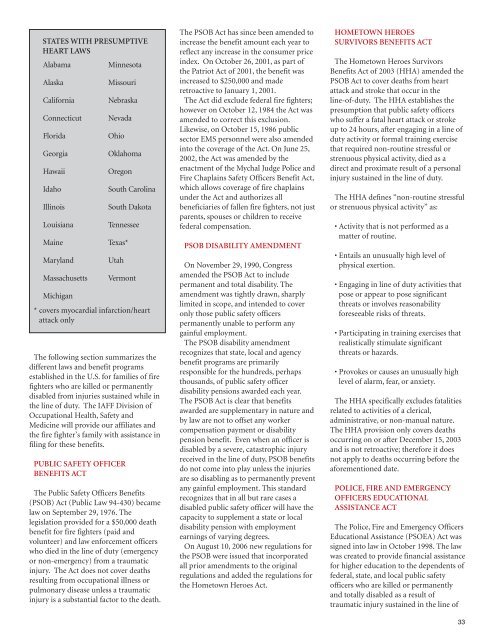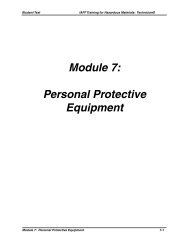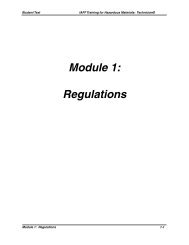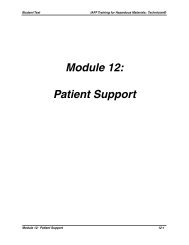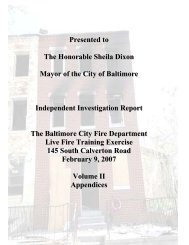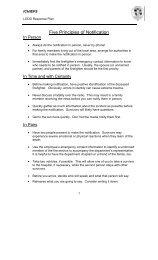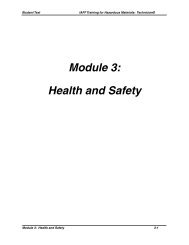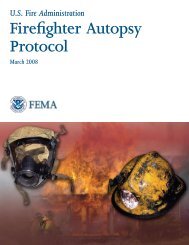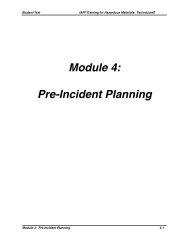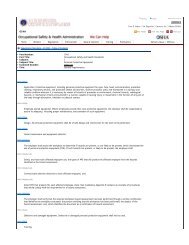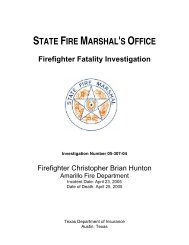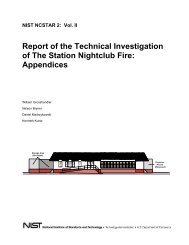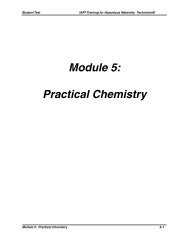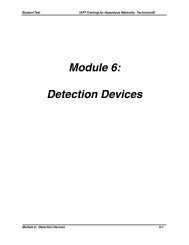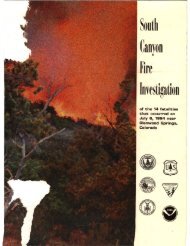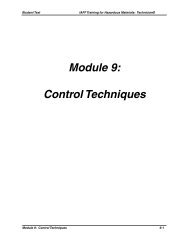Heart disease in tHe fire service - West Valley City Firefighters, IAFF ...
Heart disease in tHe fire service - West Valley City Firefighters, IAFF ...
Heart disease in tHe fire service - West Valley City Firefighters, IAFF ...
Create successful ePaper yourself
Turn your PDF publications into a flip-book with our unique Google optimized e-Paper software.
STATES WITH PRESUMPTIVE<br />
HEART LAWS<br />
Alabama<br />
Alaska<br />
California<br />
Connecticut<br />
Florida<br />
Georgia<br />
Hawaii<br />
Idaho<br />
Ill<strong>in</strong>ois<br />
Louisiana<br />
Ma<strong>in</strong>e<br />
Maryland<br />
Massachusetts<br />
Michigan<br />
M<strong>in</strong>nesota<br />
Missouri<br />
Nebraska<br />
Nevada<br />
Ohio<br />
Oklahoma<br />
Oregon<br />
* covers myocardial <strong>in</strong>farction/heart<br />
attack only<br />
The follow<strong>in</strong>g section summarizes the<br />
different laws and benefit programs<br />
established <strong>in</strong> the U.S. for families of <strong>fire</strong><br />
fighters who are killed or permanently<br />
disabled from <strong>in</strong>juries susta<strong>in</strong>ed while <strong>in</strong><br />
the l<strong>in</strong>e of duty. The <strong>IAFF</strong> Division of<br />
Occupational Health, Safety and<br />
Medic<strong>in</strong>e will provide our affiliates and<br />
the <strong>fire</strong> fighter’s family with assistance <strong>in</strong><br />
fil<strong>in</strong>g for these benefits.<br />
PUBLIC SAFETY OFFICER<br />
BENEFITS ACT<br />
South Carol<strong>in</strong>a<br />
South Dakota<br />
Tennessee<br />
Texas*<br />
Utah<br />
Vermont<br />
The Public Safety Officers Benefits<br />
(PSOB) Act (Public Law 94-430) became<br />
law on September 29, 1976. The<br />
legislation provided for a $50,000 death<br />
benefit for <strong>fire</strong> fighters (paid and<br />
volunteer) and law enforcement officers<br />
who died <strong>in</strong> the l<strong>in</strong>e of duty (emergency<br />
or non-emergency) from a traumatic<br />
<strong>in</strong>jury. The Act does not cover deaths<br />
result<strong>in</strong>g from occupational illness or<br />
pulmonary <strong>disease</strong> unless a traumatic<br />
<strong>in</strong>jury is a substantial factor to the death.<br />
The PSOB Act has s<strong>in</strong>ce been amended to<br />
<strong>in</strong>crease the benefit amount each year to<br />
reflect any <strong>in</strong>crease <strong>in</strong> the consumer price<br />
<strong>in</strong>dex. On October 26, 2001, as part of<br />
the Patriot Act of 2001, the benefit was<br />
<strong>in</strong>creased to $250,000 and made<br />
retroactive to January 1, 2001.<br />
The Act did exclude federal <strong>fire</strong> fighters;<br />
however on October 12, 1984 the Act was<br />
amended to correct this exclusion.<br />
Likewise, on October 15, 1986 public<br />
sector EMS personnel were also amended<br />
<strong>in</strong>to the coverage of the Act. On June 25,<br />
2002, the Act was amended by the<br />
enactment of the Mychal Judge Police and<br />
Fire Chapla<strong>in</strong>s Safety Officers Benefit Act,<br />
which allows coverage of <strong>fire</strong> chapla<strong>in</strong>s<br />
under the Act and authorizes all<br />
beneficiaries of fallen <strong>fire</strong> fighters, not just<br />
parents, spouses or children to receive<br />
federal compensation.<br />
PSOB DISABILITY AMENDMENT<br />
On November 29, 1990, Congress<br />
amended the PSOB Act to <strong>in</strong>clude<br />
permanent and total disability. The<br />
amendment was tightly drawn, sharply<br />
limited <strong>in</strong> scope, and <strong>in</strong>tended to cover<br />
only those public safety officers<br />
permanently unable to perform any<br />
ga<strong>in</strong>ful employment.<br />
The PSOB disability amendment<br />
recognizes that state, local and agency<br />
benefit programs are primarily<br />
responsible for the hundreds, perhaps<br />
thousands, of public safety officer<br />
disability pensions awarded each year.<br />
The PSOB Act is clear that benefits<br />
awarded are supplementary <strong>in</strong> nature and<br />
by law are not to offset any worker<br />
compensation payment or disability<br />
pension benefit. Even when an officer is<br />
disabled by a severe, catastrophic <strong>in</strong>jury<br />
received <strong>in</strong> the l<strong>in</strong>e of duty, PSOB benefits<br />
do not come <strong>in</strong>to play unless the <strong>in</strong>juries<br />
are so disabl<strong>in</strong>g as to permanently prevent<br />
any ga<strong>in</strong>ful employment. This standard<br />
recognizes that <strong>in</strong> all but rare cases a<br />
disabled public safety officer will have the<br />
capacity to supplement a state or local<br />
disability pension with employment<br />
earn<strong>in</strong>gs of vary<strong>in</strong>g degrees.<br />
On August 10, 2006 new regulations for<br />
the PSOB were issued that <strong>in</strong>corporated<br />
all prior amendments to the orig<strong>in</strong>al<br />
regulations and added the regulations for<br />
the Hometown Heroes Act.<br />
HOMETOWN HEROES<br />
SURVIVORS BENEFITS ACT<br />
The Hometown Heroes Survivors<br />
Benefits Act of 2003 (HHA) amended the<br />
PSOB Act to cover deaths from heart<br />
attack and stroke that occur <strong>in</strong> the<br />
l<strong>in</strong>e-of-duty. The HHA establishes the<br />
presumption that public safety officers<br />
who suffer a fatal heart attack or stroke<br />
up to 24 hours, after engag<strong>in</strong>g <strong>in</strong> a l<strong>in</strong>e of<br />
duty activity or formal tra<strong>in</strong><strong>in</strong>g exercise<br />
that required non-rout<strong>in</strong>e stressful or<br />
strenuous physical activity, died as a<br />
direct and proximate result of a personal<br />
<strong>in</strong>jury susta<strong>in</strong>ed <strong>in</strong> the l<strong>in</strong>e of duty.<br />
The HHA def<strong>in</strong>es “non-rout<strong>in</strong>e stressful<br />
or strenuous physical activity” as:<br />
• Activity that is not performed as a<br />
matter of rout<strong>in</strong>e.<br />
• Entails an unusually high level of<br />
physical exertion.<br />
• Engag<strong>in</strong>g <strong>in</strong> l<strong>in</strong>e of duty activities that<br />
pose or appear to pose significant<br />
threats or <strong>in</strong>volves reasonability<br />
foreseeable risks of threats.<br />
• Participat<strong>in</strong>g <strong>in</strong> tra<strong>in</strong><strong>in</strong>g exercises that<br />
realistically stimulate significant<br />
threats or hazards.<br />
• Provokes or causes an unusually high<br />
level of alarm, fear, or anxiety.<br />
The HHA specifically excludes fatalities<br />
related to activities of a clerical,<br />
adm<strong>in</strong>istrative, or non-manual nature.<br />
The HHA provision only covers deaths<br />
occurr<strong>in</strong>g on or after December 15, 2003<br />
and is not retroactive; therefore it does<br />
not apply to deaths occurr<strong>in</strong>g before the<br />
aforementioned date.<br />
POLICE, FIRE AND EMERGENCY<br />
OFFICERS EDUCATIONAL<br />
ASSISTANCE ACT<br />
The Police, Fire and Emergency Officers<br />
Educational Assistance (PSOEA) Act was<br />
signed <strong>in</strong>to law <strong>in</strong> October 1998. The law<br />
was created to provide f<strong>in</strong>ancial assistance<br />
for higher education to the dependents of<br />
federal, state, and local public safety<br />
officers who are killed or permanently<br />
and totally disabled as a result of<br />
traumatic <strong>in</strong>jury susta<strong>in</strong>ed <strong>in</strong> the l<strong>in</strong>e of<br />
33


